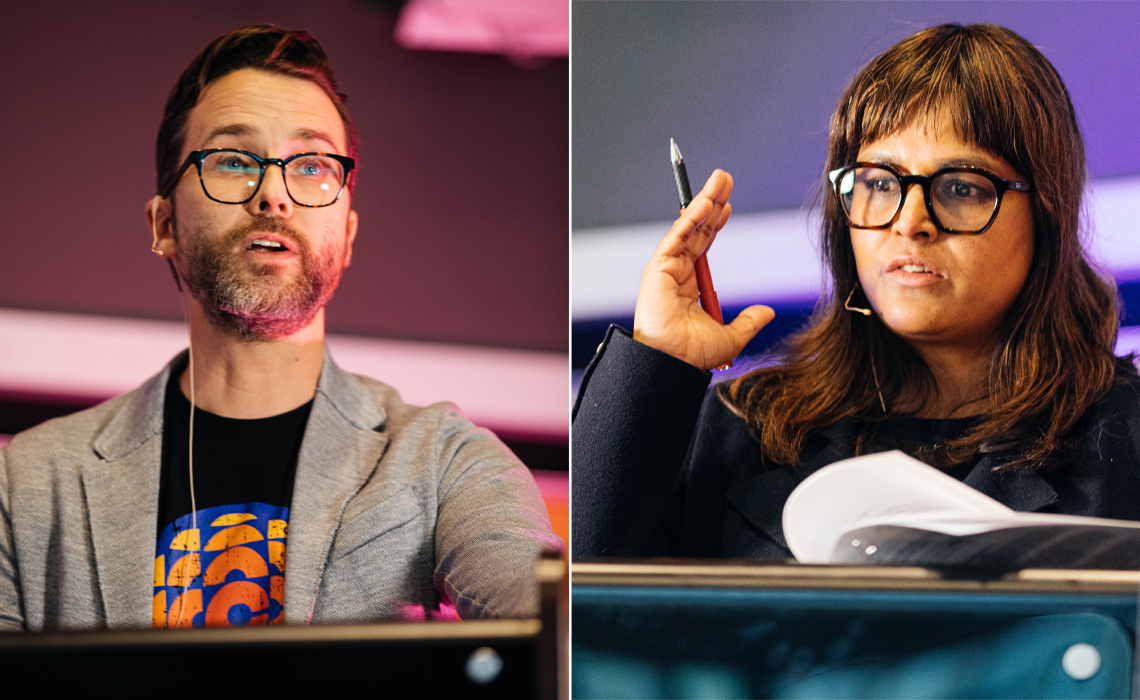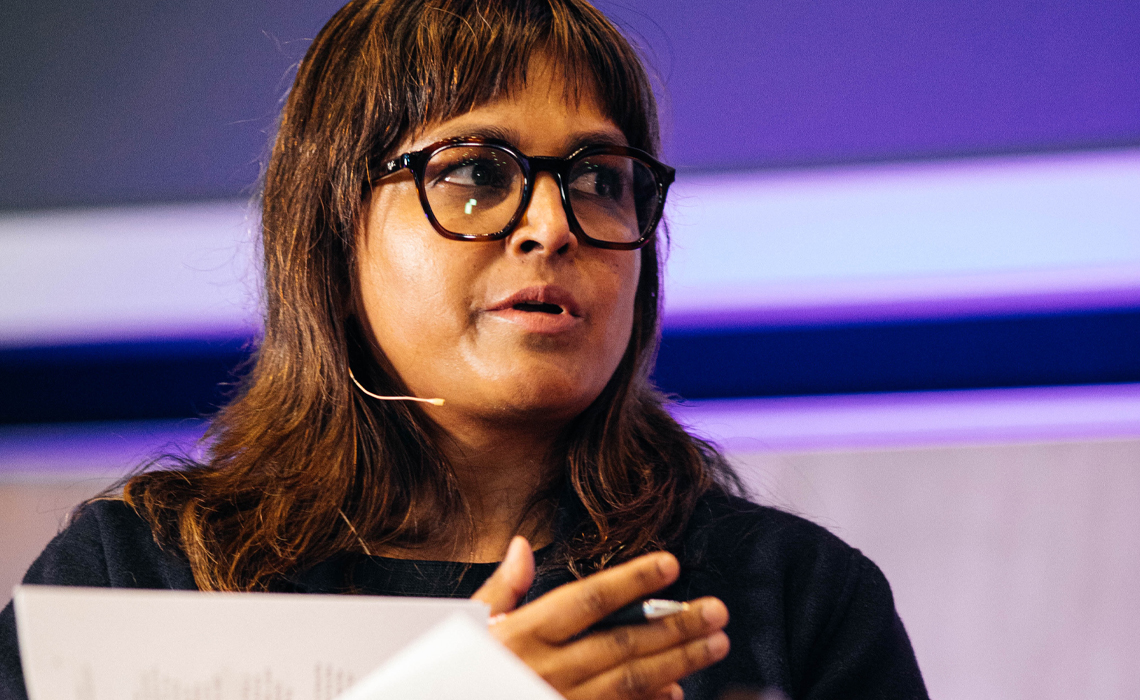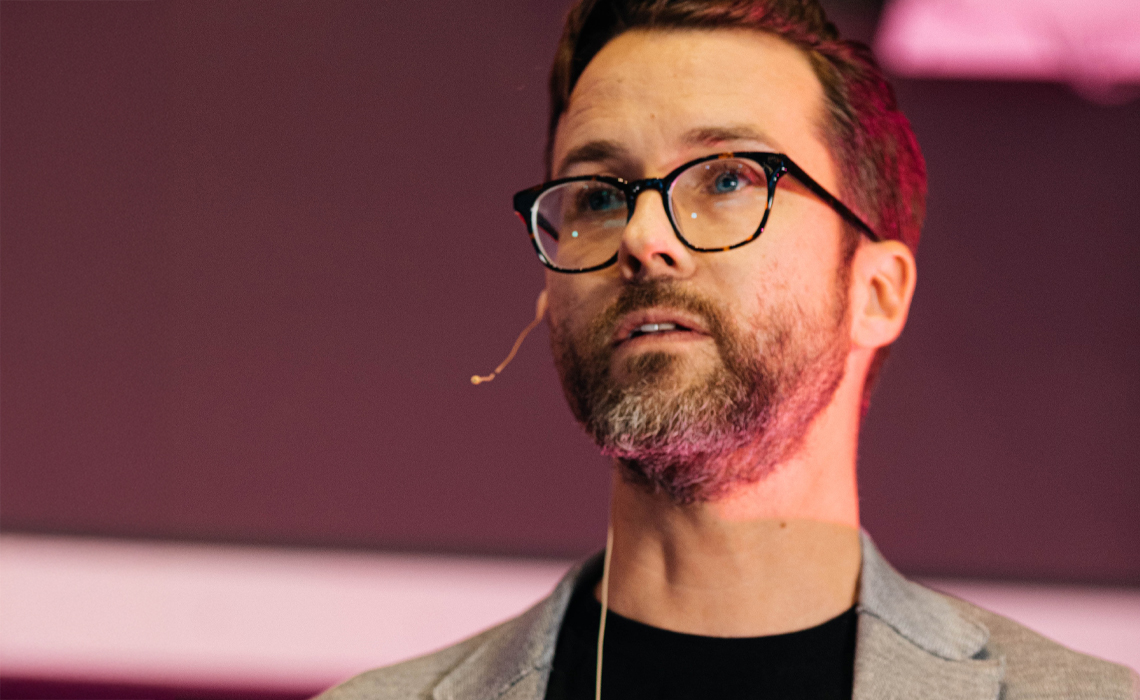Discussing the future of CBC

On April 16, Mount Royal University hosted a nationally live-streamed debate on the future of the Canadian Broadcasting Corporation (CBC) following Conservative leader Pierre Poilievre’s promise to defund the national broadcaster.
Held in Ross Glen Hall on the MRU campus, the audience of approximately 120 people included faculty, students and community members.
Dr. Leah Hamilton, PhD, MRU’s vice-dean of research and community relations with the Bissett School of Business says universities play a vital role for providing forums for debate and public ideas.
“I believe universities have a long history of serving as forums for public debate and intellectual exchange of many kinds,” Hamilton says. “MRU can play a critical role in fostering informed dialogue.”
Journalist Rupa Subramanya of The Free Press argued in favour of Poilievre’s motion while Max Fawcett from the National Observer argued against it.
The debate mimicked Oxford Union’s format. Both parties flipped a coin to determine who spoke first, followed by respective arguments based on questions provided by MRU journalism and digital media assistant professor Gabriela Perdomo Páez, PhD.
Setting the stage
Fawcett began by introducing his stance, immediately connecting his point to the Trump administration.
“In a universe without Donald Trump, defunding the CBC would still be a bad idea. It would weaken our cultural infrastructure, make it more difficult for Canadians to understand their country and open the doors wider to the affairs of misinformation and partisan rage farming,” he said.
Fawcett continued by highlighting the threat Trump poses towards Canada’s sovereignty — linking the U.S. administration’s actions and rhetoric to Poilievre’s campaign promise.
“Trump is actively threatening Canada’s sovereignty. Defunding the CBC is a willful act of cultural surrender and maybe even suicide.”
Fawcett emphasised that CBC’s funding would be better reoriented rather than removed, suggesting moving it towards radio and online coverage such as podcasts and explainers and away from television.
Subramanya however, countered Fawcett and asserted her stance by emphasizing that taxpayer dollars should not be used to fund a public broadcaster. She said Poilievre’s intention to defund CBC is a political calculation rather than a principle.
Canadians aren’t suffering from a shortage of media options, argued Subramanya. CBC/Radio Canada received $1.44 billion from the federal government in 2023/24 and produced $493.5 million in revenue.

As Fawcett pointed out, in addition to television CBC has countless other outlets including radio, podcasts, online platforms and streaming services such as CBC Gem.
“The CBC does not offer a unique public good. It distorts the media market by unfairly competing with private outlets,” Subramanya said.
She went on to add that she’s not calling for CBC and Radio Canada to be killed off but rather spun off as an independent entity. A privately funded CBC would be supported by users, subscribers, private donors and institutional supporters.
“Like what you have in the U.S. with PBS and NPR, the CBC would survive but not on the public purse.”
Following their opening statements, both speakers were given three minutes to rebut the opposing points. Fawcett countered Subramanya on her claim that CBC would survive just like PBS and NPR by emphasizing the difference in Canadian and American economies. He argued that leaving CBC in the free market with wealthy foundations will create a void that won’t be filled.
Quoting the Wall Street Journal, Fawcett remarked “You can’t make a business out of local news these days because of social media, YouTube and independent companies.”
Subramanya, however, argued that social media, streaming services and new companies are what will help CBC in the free market.
“Everybody is basically a journalist. A high-school student can write a Substack and write about issues that they care about — issues that are important. It is not the role of the government to step in and fix everything,” she said.

Perdomo Páez presented the debaters with questions provided beforehand, such as, “Why do conservatives want to axe the CBC and why is the public broadcaster loathed by some Canadians?”
Fawcett replied, “They want to cut it because they don’t like the role it plays in our informational ecosystem — one that is well supported by good journalism.”
Subramanya emphasized the lack of justification for forcing taxpayers to subsidize a public broadcaster.
“If the CBC is as valuable as we claim, it should stand on its own merit and should face the test of competition. Why are we so afraid?”
The aftermath
In a post-debate interview, Fawcett highlighted the importance of engaging in in-person conversation and public debate.
“It’s way too easy to be mean to people from behind a screen. This is a good countermeasure for that,” he said. “It’s far healthier and more constructive than a Twitter [now X] debate.”
Audience members Alice Swabey, associate professor and chair of the Library, and Francine May, associate dean of research at the Library, said they found the debate both cordial and respectful, considering the current level of public discourse.
“It was interesting how both [debaters] approached their arguments differently. It was conciliatory, which is sort of what the CBC does — it brings us together,” Swabey said.
Writer Ava Free is a student with Mount Royal’s Bachelor of Communication — Journalism and Digital Media major. Students learn how to write and produce stories ranging from investigative reports to sports, entertainment, science and human rights coverage.

